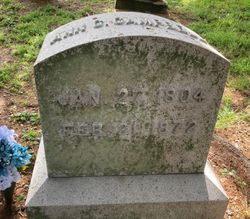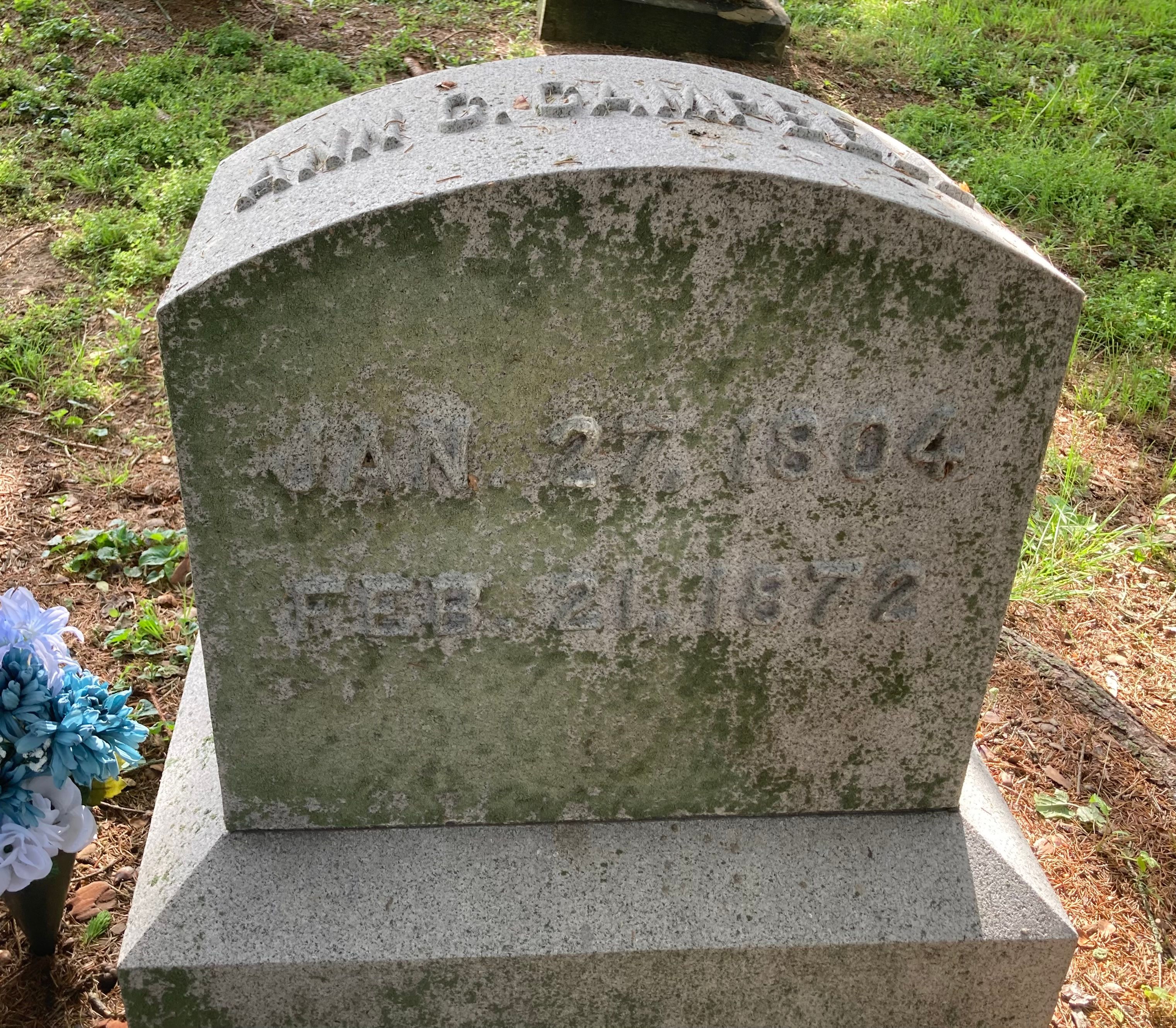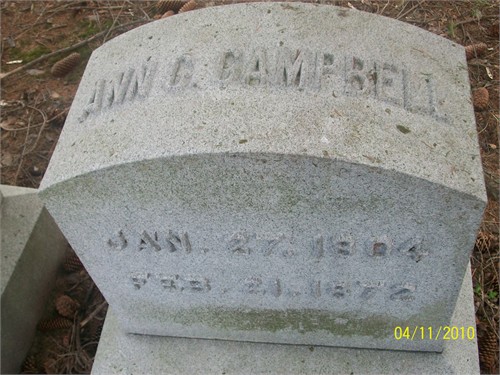Ann Clinch was born in 1804 in England, an came to this province, when one year old, with her parents. Her father soon died of yellow fever in New York City. Her mother Sarah Lugg Clinch Blackwell went to Jersey Shore, married one Mr. Enoch Blackwell. She was brought up on the Delaware River, Town of New Hope, by one Peter Blackwell. She stayed there until she was eighteen years of age. By the suggestion of her mother, Joseph Campbell went to her place and she came with him to Beecher's Island, the home of her mother; stayed there till the spring of 1822. They married, went to housekeeping on the farm that Joseph, Jr. now owns and lived there until she died in 1872, aged sixty-eight years.
She was very efficient in helping clear and pay for the farm; reared a family of eleven children. Our garments were all made by her industrious hands for both summer and winter wear. She spun flax and tow and had the yarn wove into cloth for their first bedtick, Her mother gave her a pair of pillows. She raised geese and made a feather bed so they had one good bed at this time. She also made quilts and comfortables. She would get her children in bed and go out with her husband and chunk up and burn the heaps until midnight. The flats were covered with pine trees. They girdled them that they might die. Then they burned them down to get rid of them. The clearing was very heavy.
The ruin of the old house still remains to remind us of the many happy days spent there and the long winter evenings when we studied our lessons or played games; father reading the newspaper or Bible, while mother was always busy with the needle. The girls did the knitting. Six of us would be knitting at once. We would try stents to see which was the fastest knitter. Eleanor wore the belt. Our light was a pitch pine torch in the fire place. We had our time for play. I remember the grape vine swings that Uncle Richard Ellison's children and ourselves would fix up on the butternut trees. If we didn't provide ourselves with strings, we would tear our aprons into strings to tie the vines together. The grape vines grew along the river on the north side of the farm.
I remember brother John and myself crossed the river, went down along Losy's pond to gather beech nuts. We got a nice lot of them but, on coming back found that the river had swollen. We were not cowardly for I got a pole and told John to go above me. The nuts were in a sack and I put them over my shoulder and we went through all right. If mother had seen us she would have been down there too quick.
The first school teacher I can remember is Ruie Bacon. Eight of us children went at once. One stayed to carry the dinner in a large pail. One dinner was composed of hocks and johnnycake. Willard Gibson taught that term and he ate with us; said he never ate so good a dinner.
Mother's children can rise up and call her blessed, her husband also, and he praiseth her.
I can remember going to prayer meeting with mother to old Grandmother Bottom's and in the log school house over the creek. It can be said of her, she riseth also while it is yet night and giveth meat to her household and a portion to her maidens. Her husband is known in the gates when he sittith with the elders of the land. She seeketh wool and flax and worketh willingly with her hand.
It seems but a step to look back in memory when this country was a vast body of timber. I can remember when the road leading to Nelson was so thickly timbered what it was dark in the day time.
When we go back to the home of our childhood how all the scenes and memories of those days crowd into our minds and hearts. Sister Hughey and myself enjoyed that privilege last summer. We visited our old playgrounds, went into the orchard, could point out our favorite trees where we got the best apples. I do not think the scenes from childhood can ever be obliterated from memory, from my earliest recollections to the present time. I have found joys and sorrows, losses and errors, but have learned to look on the bright side of life. Our chief end is to glorify God and enjoy him forever, keeping eternity in view and all will be well.
Ann Clinch was born in 1804 in England, an came to this province, when one year old, with her parents. Her father soon died of yellow fever in New York City. Her mother Sarah Lugg Clinch Blackwell went to Jersey Shore, married one Mr. Enoch Blackwell. She was brought up on the Delaware River, Town of New Hope, by one Peter Blackwell. She stayed there until she was eighteen years of age. By the suggestion of her mother, Joseph Campbell went to her place and she came with him to Beecher's Island, the home of her mother; stayed there till the spring of 1822. They married, went to housekeeping on the farm that Joseph, Jr. now owns and lived there until she died in 1872, aged sixty-eight years.
She was very efficient in helping clear and pay for the farm; reared a family of eleven children. Our garments were all made by her industrious hands for both summer and winter wear. She spun flax and tow and had the yarn wove into cloth for their first bedtick, Her mother gave her a pair of pillows. She raised geese and made a feather bed so they had one good bed at this time. She also made quilts and comfortables. She would get her children in bed and go out with her husband and chunk up and burn the heaps until midnight. The flats were covered with pine trees. They girdled them that they might die. Then they burned them down to get rid of them. The clearing was very heavy.
The ruin of the old house still remains to remind us of the many happy days spent there and the long winter evenings when we studied our lessons or played games; father reading the newspaper or Bible, while mother was always busy with the needle. The girls did the knitting. Six of us would be knitting at once. We would try stents to see which was the fastest knitter. Eleanor wore the belt. Our light was a pitch pine torch in the fire place. We had our time for play. I remember the grape vine swings that Uncle Richard Ellison's children and ourselves would fix up on the butternut trees. If we didn't provide ourselves with strings, we would tear our aprons into strings to tie the vines together. The grape vines grew along the river on the north side of the farm.
I remember brother John and myself crossed the river, went down along Losy's pond to gather beech nuts. We got a nice lot of them but, on coming back found that the river had swollen. We were not cowardly for I got a pole and told John to go above me. The nuts were in a sack and I put them over my shoulder and we went through all right. If mother had seen us she would have been down there too quick.
The first school teacher I can remember is Ruie Bacon. Eight of us children went at once. One stayed to carry the dinner in a large pail. One dinner was composed of hocks and johnnycake. Willard Gibson taught that term and he ate with us; said he never ate so good a dinner.
Mother's children can rise up and call her blessed, her husband also, and he praiseth her.
I can remember going to prayer meeting with mother to old Grandmother Bottom's and in the log school house over the creek. It can be said of her, she riseth also while it is yet night and giveth meat to her household and a portion to her maidens. Her husband is known in the gates when he sittith with the elders of the land. She seeketh wool and flax and worketh willingly with her hand.
It seems but a step to look back in memory when this country was a vast body of timber. I can remember when the road leading to Nelson was so thickly timbered what it was dark in the day time.
When we go back to the home of our childhood how all the scenes and memories of those days crowd into our minds and hearts. Sister Hughey and myself enjoyed that privilege last summer. We visited our old playgrounds, went into the orchard, could point out our favorite trees where we got the best apples. I do not think the scenes from childhood can ever be obliterated from memory, from my earliest recollections to the present time. I have found joys and sorrows, losses and errors, but have learned to look on the bright side of life. Our chief end is to glorify God and enjoy him forever, keeping eternity in view and all will be well.
Family Members
-
![]()
William Campbell
1822–1875
-
![]()
Sarah "Sally" Campbell Congdon
1824–1892
-
![]()
Sarah Ann "Sally" Campbell Abbott
1824–1892
-
![]()
Mary Ann Campbell Seely
1826–1894
-
Eleanor Campbell Bosard
1828–1910
-
![]()
Elizabeth B. Campbell Hughey
1831–1904
-
![]()
Phebe Campbell Hoyt
1832–1917
-
![]()
Jane Campbell Tubbs
1834–1916
-
![]()
PVT John Harper Campbell
1836–1899
-
Thomas Campbell
1838–1839
-
![]()
Joseph D Campbell
1839–1909
-
![]()
Maria B. Campbell Loop
1842–1873
-
![]()
Julia P. Campbell Selph
1845–1873
Advertisement
Records on Ancestry
Advertisement





















